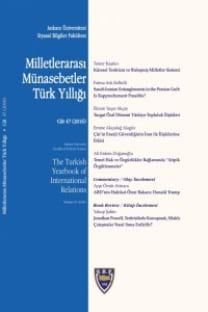The Cold War Re-Visited: Explaining and Understanding of the End of the Cold War in Light of Neo-Realism
Neorealism is certainly the most analyzed and criticized theoretical approach. This study is no exception. The Cold War was unexpectedly ended in the 1989- 1991 period. One of the main criticisms of neorealism is that it failed to predict an end to the Cold War. In international relations discipline, theories have rarely predictive ability. For the neorealist theorists, especially Waltz claims that the prediction issue is not a major criticism because neo-realism does not aim to predict the behavior of individual states at any given time. The main objective of neorealism is to explain the logic of individual relationships in the international state system. This article aims to offer new ideas whether neorealism tells us about the Cold War in terms of explanation about the events that may reemerge in global political scene almost twenty-five year later. Another important contribution of this article is to analyze the success and failure of the neorealist explanation and understanding of the Second Cold War of 1979-1985 in order to shed lights on the future the Third Cold War that is a political reality in terms of a Russian threat and a West response after the 2014 Crimean Crisis. It should be stressed that neorealism has the explanatory rather than the predictive power.
Anahtar Kelimeler:
Cold War, Neorealism, Kenneth Waltz, Soviet Union, United States, Third Cold War
The Cold War Re-Visited: Explaining and Understanding of the End of the Cold War in Light of Neo-Realism
Neorealism is certainly the most analyzed and criticized theoretical approach. This study is no exception. The Cold War was unexpectedly ended in the 1989- 1991 period. One of the main criticisms of neorealism is that it failed to predict an end to the Cold War. In international relations discipline, theories have rarely predictive ability. For the neorealist theorists, especially Waltz claims that the prediction issue is not a major criticism because neo-realism does not aim to predict the behavior of individual states at any given time. The main objective of neorealism is to explain the logic of individual relationships in the international state system. This article aims to offer new ideas whether neorealism tells us about the Cold War in terms of explanation about the events that may reemerge in global political scene almost twenty-five year later. Another important contribution of this article is to analyze the success and failure of the neorealist explanation and understanding of the Second Cold War of 1979-1985 in order to shed lights on the future the Third Cold War that is a political reality in terms of a Russian threat and a West response after the 2014 Crimean Crisis. It should be stressed that neorealism has the explanatory rather than the predictive power.
Keywords:
Cold War, Neo-Realism, Explaining and Understanding,
___
- Referans 1 Deudney, Daniel and John Ikenbery, “The International Sources of Soviet Changes”, International Security, vol. 16, no. 3, Winter 1991-1992, pp. 74-118. http://www3.nccu.edu.tw/~lorenzo/Deudney%20and%20Ikenberry%20Inter national%20Sources.pdf (access date 03.12.2016).
- ISSN: 0544-1943
- Yayın Aralığı: Yıllık
- Başlangıç: 1960
- Yayıncı: Ankara Üniversitesi Siyasal Bilgiler Fakültesi Uluslararası İlişkiler Bölümü
Sayıdaki Diğer Makaleler
“Kapital’e Karşı Devrim”: Antonio Gramsci’nin Bolşevik Devrimi Analizi
Lübnan’da Şii Siyasi Hareketin Evrimi: EMEL’den Hizbullah’a
Sovyet-Çin Uyuşmazlığını Anlamak: 20. Kongre’den 1963 Parti Mektuplarına
Kitap İncelemesi: Destroying a Nation, the Civil War in Syria
The US Bases and Their Contributions to US Hegemony
Gülten ÜSTÜNTAĞ, Ayşe Ömür ATMACA
The Foreign Policy Doctrine of the Holy See in the Cold War Europe: Ostpolitik of the Holy See
Hechter'in İç Sömürgecilik Kuramı ve Bangladeş'in Bağımsızlık Süreci: Çevre'nin Ulusal Kimlik İnşası
